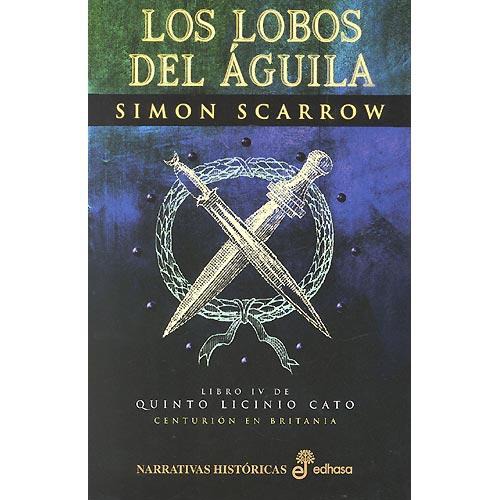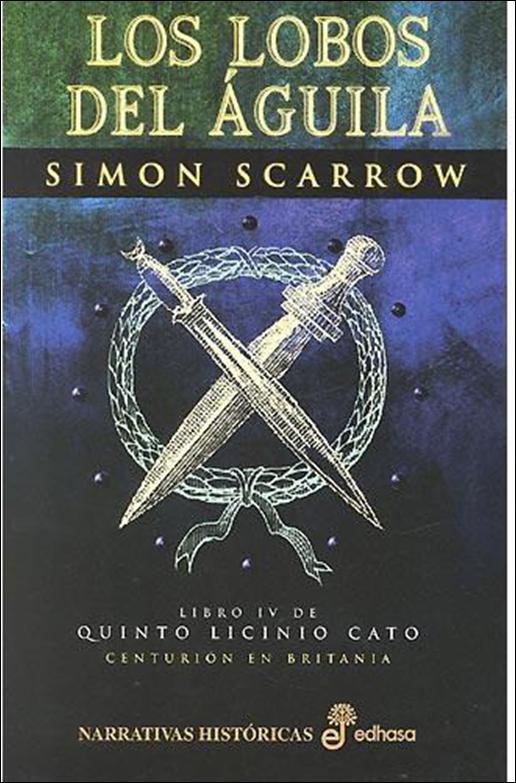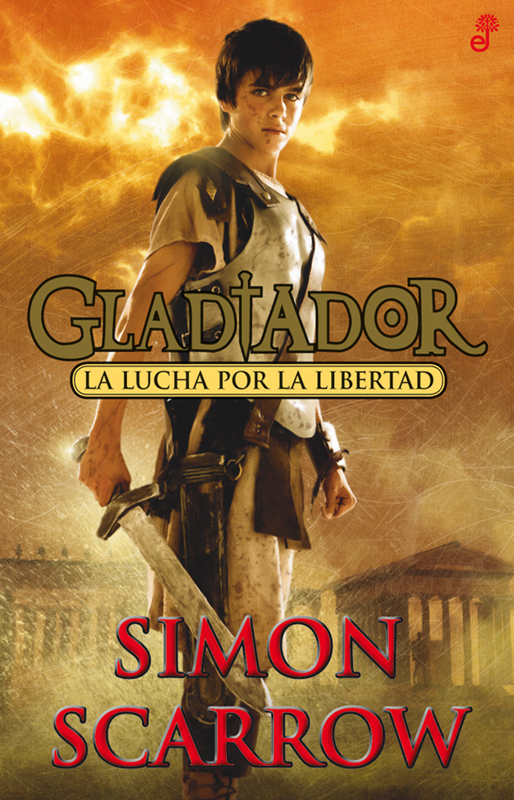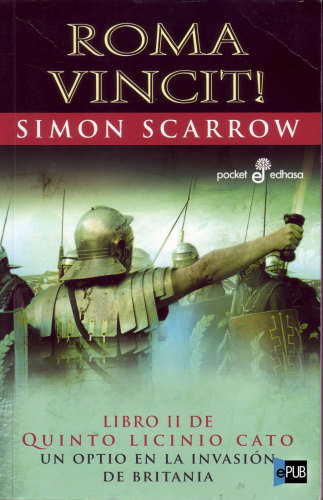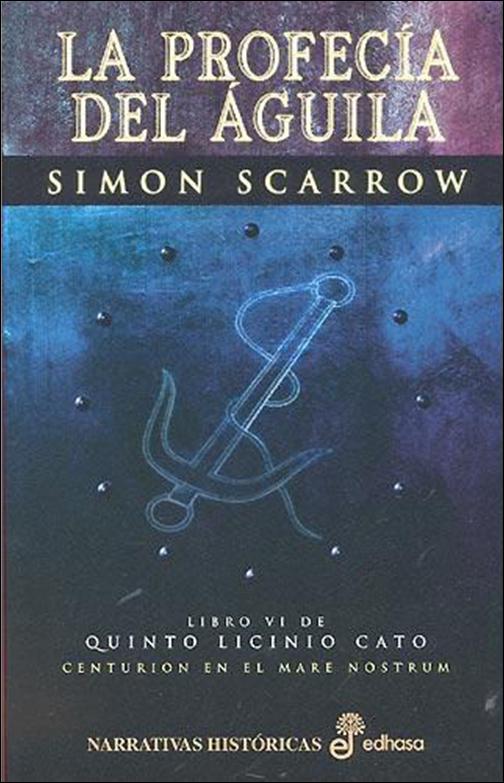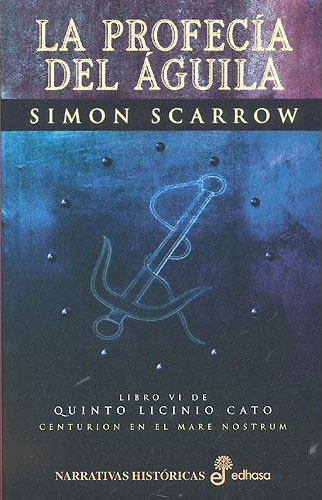oleebook.com
El Gladiador de Scarrow, Simon
de Scarrow, Simon - Género: Ficcion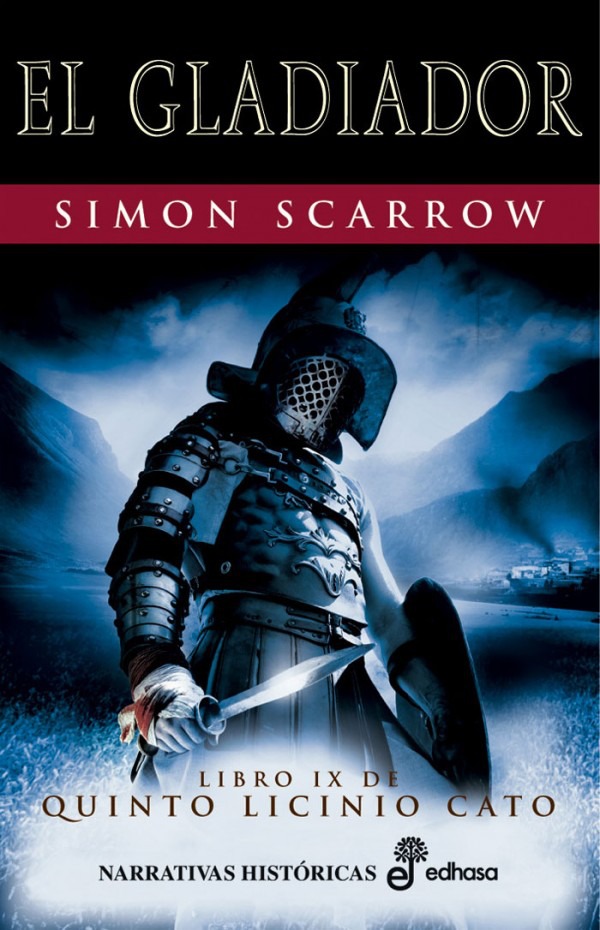
Sinopsis
Tras sus peripecias por Palmira, Macro y Cato regresan por mar a Roma cuando una violentísima tormenta los lanza a un escenario dominado por el caos. Creta acaba de ser víctima de un terremoto devastador que ha acabado con casi toda autoridad romana, y los habitantes de la isla intentan sobrevivir como pueden en un ambiente dominado por la miseria y la anarquía. Cuando Macro y Cato intenten tomar las riendas de la situación e imponer un mínimo control, descubrirán que el hambre, el riesgo de epidemias y las carencias de personal sanitario suficiente son sólo males menores. Un viejo amigo de los dos oficiales romanos, Ajax, ha encontrado en el desorden creado por el terremoto una oportunidad excelente para liderar un levantamiento de esclavos.
Descargar
Descargar El Gladiador ePub GratisLibros Recomendados - Relacionados
Rese√Īas Varias sobre este libro
¬ď?? ???? ??????? ?? ???????? ?? ????? ??? ?? ??????? ?? ?????¬Ē.31 s Clemens Schoonderwoert1,166 106
Read this book in 2009, and its the 9th volume of the wonderful "Eagle" series, featuring Cato & Macro.
In this tale Cato and Macro are returning home to Rome from their campaign against the Parthians, but when nearing home soil their transport ship will encounter a tidal wave and nearly get capsized.
Cato and Macro and the rest of the ship can just make to the port of Matala in Crete, and there they will find a devastated town.
This devastation is the result of an earthquake, and not long after its aftermath the island's slaves begin a revolt, while at the same time local bandits, lead by a gladiator, are taking advantage of the slave rebellion, and urging the Cretans to overthrow the Romans.
Many of the island's troops are either dead or wounded by the earthquake, the local Governor of the Province call on Cato and Macro for their help in suppressing this revolt.
What is to follow is an amazing and thrilling Roman adventure, in which our friends, Cato and Macro, will excel in their determination and resourcefulness to stop this revolt, and with luck but also with cunning and true leadership on their side when fighting these rebels, they will be able to quell this rebellion and bring peace to this Province.
Highly recommended, for this is another excellent addition to this great series, and that's why I to call this episode: "A Superb Roman Eagle Gladiator Adventure"!9 s William Ballard2
I picked this book up at The Works on a sale, not realising that there are 8 books before it, and there are more after too. I have around 13 more books to read to catch up on the series, and if they're are all this one, they shall be a pleasure to read. Simon Scarrow's gripping plot in this is very easy to read. That is, it pulls you right into the action from the first few pages. Also, as someone who hasn't read the other books, I found it easy to follow what was happening. It is a fantastic story in its own right, but I look forward to reading the other books to get a sense of where this plot fits with the others.7 s Beorn300 60
Yet another Scarrow book where he insists on crowbarring a siege into the novel, where the plucky heroes are terribly outnumbered by their dastardly ragtag rebel enemy.
Fortunately for Scarrow, that portion of the story only takes up just under a third of the book, so there's plenty of other action to distract from that annoying niggle, including some sloppy garrison troops, a kidnapping and a clever climactic battle victory.
For those unfamiliar with the series so far, this book sees the return of one of the protagonists from The Eagle's Prophecy who, much our heroes, finds his path accidentally but fortuitously allows him to wreak a path of bloody vengeance against everyone that comes his way.
This is actually one of the better books in the series so far as there's relatively little of the trudging rehashing, turgid gnashing of teeth or spell of repetition that made the previous books so frustrating.
It's still not on a par with a number of other Roman fiction authors I've read but it's a good, enjoyable way to spend your time I guess.
Slightly disappointed that the story has to roll over into another book as I've a sinking feeling that Scarrow may waste what has been a good plotline so far and, along with the obligatory siege he's undoubtably going to force into the plot of the next book, may well turn it into a stale affair where everything goes out not with a bang but a bloody whimper, in both senses of the word.historical-fiction romans4 s Steve 61 58
The Gladiator... Macro and Cato are still quite a double act (Cato being the straight guy, with Macro not usually intending to be funny *laughing just thinking about it*). I won't ruin the plot so far, but they're each strong enough character's to carry a chapter on their own. They are Optio/Centurion's/Prefect's/Tribune *smiling*, depending on what fate has carved for them. Here they are stranded in a different scenario and up against the odds once again. This time against a former slave, a former Gladiator, and an entire army of risen men and women. The Gladiator has battle knowledge, a really good strategist, and this is not what they need. But it appears to be more personal, especially where Macro and Cato are concerned. Oh, and Cato's has a young love to consider, and vice versa. Truly good characters and well written... So far, so good, though the start I didn't find to be the best entrance into the book, it was necessary.
It's somehow different to the others in the Eagle series. It's not just the beginning (though that is part of it), it's also the placing (a small island), the secondary characters and Catos' betrothed. Maybe even a different style to Scarrow's writing in this one, but a major factor is that Macro and Cato are seperated in many a chapter (most of the book). That said, I'd still recommend it and have to give it 4 stars.historical-fiction3 s Olethros2,665 490
-Por fin un antagonista que¬Ö no, tampoco.-
Género. Novela histórica (en un sentido muy amplio de la palabra).
Lo que nos cuenta. Cuando Macro y Cato, junto a la futura familia pol√≠tica de √©ste, tratan de volver a Roma, el tsunami generado por un terremoto les hace naufragar en Creta. Pero hay otro problema: esclavos rebeldes en gran n√ļmero que tienen su propia visi√≥n de c√≥mo hay que actuar contra el dominio de la Antigua Roma en la isla. Adem√°s, est√°n liderados por alguien relacionado con el pasado de la pareja protagonista y no para bien. Noveno libro de la serie de Quinto Licinio Cato.
¬ŅQuiere saber m√°s de este libro, sin spoilers? Visite:
http://librosdeolethros.blogspot.com....3 s Christopher TaylorAuthor 10 books76
Although this is deep into a series of novels about Roman soldiers Macro and Cato, it didn't feel as though I'd missed much because the story stands well on its own. The research is good and the situation interesting, involving a massive earthquake that tore Cyprus apart in the middle of the first century AD and a slave revolt.
Overall the story was pretty well done, and rarely goes a direction you expect. Things that are planned almost never go as intended, but overall the good guys generally win. I do have a problem with the way the soldiers speak -- always a concern when writing historical novels, particularly this far in the past. Colloquialisms and patterns of speech that are too modern feel jarring, but no one is exactly sure how people spoke 2000 years ago, either.
A decent novel, part of a series I'm willing to try another book in, but not enormously compelling to me.2 s Dennis Steussy81
I'm reading the Simon Scarrow Eagle series. This nineth book was very good and full of mystery. It takes place on an island near Italy and is part of a slave revolt. While all of the books in this series are very brutal in their description of battle scenes, this one is especially strong in this area and isn't a book for the faint of heart. This could be a stand along book in the series too.2 s the tony.36 1 follower
I really enjoyed this book, if your a fan of Game Of Thrones then I think you¬íll enjoy it as well. Not as complex as GOT but same flavor. Lengthy but easy to read, never was too boring, very well written, author did great job in engaging the reader to finish the book ASAP. I also found it intriguing that the whole time reading I wasn¬ít sure what ¬ďteam¬Ē I was rooting for, the Romans or the rebellious slaves. The author did a great job of portraying both sides leaving the reader to decide who they wanted to win. I look forward to reading more from this series. 1 Rui Gel157 8
Fantástico, como nos habituou, e com direito a bónus no final. A saga continua: Siga!1 Antonio188
3.50minha-biblio1 Miquel16
Bé, bénovel-les1 Carl Pegelow7
This is a very gritty book which I enjoyed but I could not understand the modern day dialect which didn't fit the times. Needs a follow up to complete the story.1 Maximilian Stein63 1 follower
Mit dem Neunten Teil der Rom-Serie liefert Simon Scarrow wieder das, in was man sich in den letzten acht Romanen verliebt hat. Das neue Abenteuer von Cato und Macro lässt den Leser wieder in das Römische Reich des 1. Jahrhunderts nach Christus eintauchen und auch im Neunten Buch verzaubert dieser Einblick genauso, wie beim ersten Mal.
Wie immer ist die Geschichte nicht die Originellste und Spannenste, die man jemals geh√∂rt hat, aber das muss sie auch nicht sein. Die B√ľcher leben ja schlie√ülich vom Setting und den mittlerweile ans Herz gewachsenen Charakteren Macro und Cato.
Das Thema, dass Scarrow dieses mal aufgreift ist Sklaverei. Ein Thema, was damals wie heute eine große Rolle spielt. Die Probleme und moralischen Schwierigkeiten, auf die die Protagonisten stoßen, existieren unserer Zeit genauso wie damals, bloß ist Sklaverei mittlerweile modernisiert worden und nennt sich nicht mehr so. Indem Scarrow beide Perspektiven, die der Sklaven und die der Herren, darstellt, macht er klar, dass das Thema doch komplizierter ist, als man es gerne darstellt.
Simon Scarrow ist einfach ein Meister darin, zu zeigen, dass Geschichte allgemein g√ľltig und nicht nur etwas ist, was fr√ľher einmal war, sondern etwas, was immer bleibt. 1 Redfox51,582 63
Scarrow has really stepped up his game this one. Started it yesterday and finished today. The best Eagle book so far :) At the end of the last book Cato and Macro were headed back to Rome to be reassigned and for Cato and Julia to get married....awww.
Things don't go to plan as an Earthquake and tidle wave hits Crete just as their ship is floating past it. With many of the people in charge killed and a full on slave revolt, it's up to Macro and Cato to save the day again.
I've said it before and I'll say it again. Cato and Macro have one of the best fictional relationships I've ever come across. They are great characters and even though I should feel sorry for the slaves, as their lives are terrible, well not Ajax -he deserves it, because they are against them I just want them to lose. There is lots of drama and excitment in this one as Macro and Julia are taken captive. Cato gets underestimated more than normal in this book which I didn't , I think he's proved himself by now!
Although the end of this book is sorta happy, it ends with Cato and Marco heading off on another adventure and that wedding I was looking forward to in the last book seems to have been pushed back again. A great addition to the series but could also be read as a standalone novel. crete egypt fiction ...more1 D.w.Author 10 books24
After success in the last book, and as this is a series, we do expect success by the end of the novel, it is time to make our way home to Rome and for the heroes to get their rewards. Macro and Cato have been stepping up and giving great needed service to Rome, and Claudius and they deserve accolades.
Instead an earthquake and tidal wave beset them as they are near Crete. It throws the Island into turmoil, seriously hammering the infrastructure and forcing our two Centurions to step up once more.
We see the continuing evolution of Cato as a leader and we also see that Macro, once the Master, now becoming the lieutenant. Something that we knew from book one was a possibility and long overdue.
What comes as an unexpected and pleasant addition is that we have an enemy who we had left behind long ago, emerge. One that gives us plausible cause to believe he is not only present at the recovering Crete, but his actions will and do impact the story.
In all, a very good book and nice to see Cato finally on his path instead of treading water. A definite reread when we have the entire series finished.fiction reviewed1 David Campton1,108 33
Wherever Centurions Macro and Cato go their paths are dogged by disaster. This time their doomladen shadow falls on the island of Crete, and while the story was inspired by a holiday that Simon Scarrow took on the island, this episode in the ongoing series is no holiday for those involved, as they get caught up in an earthquake, tsunami and a Spartacus- slave rebellion. Scarrow touches briefly on the necessity and cruelty of the slavery system in the Roman Empire, but sadly doesn't capitalize on that to create sympathy for the rebels, partly because the leader, Ajax, comes across as a 2 dimensional melodramatic villain, with some very stilted dialogue. This is unusual for Scarrow, who normally draws up very believable characters. What is not unusual is that the scenes between Cato and his beloved Julia are embarrassingly cringeworthy. Please Simon, stick to describing battlefield gore rather than romantic twaddle.historical-fiction1 James Casey333 5
Macro and Cato are returning from Palmyra on a ship bound for Rome, fellow passengers include senator Sempronius and his beautiful daughter and the love of Cato, Julia.
Whilst passing Crete, the island is shattered by a devastating earthquake and the ship is almost wrecked by a tidal wave and cheating death the passengers and most of the crew become beached on a Cretan shore. The group trundle to the garrison town of Matala and discover that the island has not only been devastated by the earthquake but also succumbed to a slave rebellion led by an ex gladiator named Ajax, a man who has an almighty grudge against Rome and also, coincidentally, against Macro and Cato. Our heroic duo realise that it won’t be so easy to quell the uprising with this man in charge.
This is a different situation for Macro and Cato because they are not under military orders but have to rely mainly on their own nous and experience, and it makes for a really entertaining story. Once again full marks.1 Dawn1,299 73
It would have been much better to read this prior to The Legion. Both because I had no idea what was going on in the later book when I read it and this time because I knew what the outcome would be already.
I find that I prefer the books in this series that have a little more of the political in them, rather than the all battle (or lead up to a battle) sequences such as this one. So, not the best in the series in my opinion but still with great characters and lots of good history.
historical-fiction1 Jack AlrikssonAuthor 2 books2
This book convinced me to give up on the series. I've read all previous novels and I've got used to the thin plots, poorly-written villains and predictable plot twists. I didn't mind them much, I was reading them mostly for the battles.
However, Gladiator was dull. Rather ridiculous plot, characters acting, well, out of character, decisions that defy even the most primitive logic and descriptions that gave Crete (where the action is supposed to take place) the charming air of "generic Greek island". 1 Nathan BalyeatAuthor 1 book5
Another historical fiction about the Roman legionaires Macro and Cato, this one probably takes the most historical license of all of them.
I really don't care. I still the characters, the plot is still enjoyable, and the overall story arc advances in a direction that I'm interested in.
It's definitely a good read.historical-fiction reviewed-20101 Deborah Pickstone852 91
My second Scarrow read in 2 days. Will poor Cato ever get to stand still long enough to marry his beloved? He and Flash Gordon....er, Macro only have fourteen hours to save the earth......
Yup, heroic and impossible derring-do in the hands of a pretty sound historian and gifted writer result in pretty gripping stuff! More, please!history-of-all-things human-nature lets-be-pacifists ...more1 Patrizia811 15
Erdbeben = Chaos = Aufstand der Sklaven gef√ľhrt von einem Gladiator der nur eines will => RACHE 20141 Lawrence600 28
Surprise! I loved it. But not for the reason I bought it for, but for the book's remarkable description of the lack of morality of all the characters.
I picked the book up on sale at a bookshop in Parma, Italy, because I thought it would be a good way to learn more Italian. I was attracted to the cover (a big gladiator in a helmet) because I thought there'd be plenty of action. And there was. How not when the setting is the Roman empire in the first century A.D., and the story revolves around a catastrophic earthquake in southern Crete, the ensuing collapse of civil society, and a slave rebellion.
What surprised me is that the story did not provide any people to root for. There were no heroes. At the beginning of the book, I was convinced that, of course, the Romans were the good guys as they were the main characters trying to take the chaos in hand. But they weren't so good. They were convinced of their excellence and superiority. If you think of them as occupying Nazis, you get a better view of their sway. In terms of the slave rebellion, you get a view of the systemic subjugation and de-humanization of huge numbers of people - another Nazi quality. The Romans actually believe that slaves are to be used as cogs in a machine, the industrial agricultural machine, for example; that they don't need really to be fed well, etc.; that it doesn't matter if children are taken from mothers. (It all sounds familiar because it was done in this very country just a 150 years ago and not 2000 years ago!) From our point of view, the "heroes" are flawed. At the same time, the members of the slave army elicit our compassion, but they have a desperation that leads to gross violence, acts of revenge, and so forth.
So the author had to confront the problem of a "truthful" ending that comported with both history, that is, continued Roman domination, and at least this reader's sympathy with the slaves and feelings of revulsion for the Nazis. He manages this pretty well in a cliffhanger last couple of chapters. He also lays the ground for more books!
Take a look at this book. It and the others in the series were written in English. So, they must be available. (I read the Italian because I thought a translation from the English might give me a vocabulary "assist.") GingerOrange1,171 16
2.5 stars.
In all honesty, it was just meh.
So I know going into a series without reading the previous books may be bad but I was unprepared for how unconnected I was with the main characters in this novel. Right off the bat, Cato and Macro did nothing for me. They were pretty predictable and I couldn’t completely get a feel for them. The action was okay if again predictable and sort of unimaginative.
But the thing that really let me down the most was the writing. I felt that the speech and mannerisms in this book were far too modern for the setting. It’s set in Ancient Rome and yet the characters spoke with modern day slang. It just didn’t fit with the time period and I could not sink into the story as much as I wanted to.
Besides that, I wasn’t rooting for the main heroes. Instead, I was in support of the antagonists. I mean, Cato and Macro are fighting against a slave revolt. Am I supposed to side with the slave masters? Hell nope. I know the presence of slavery in the story was just indicative of the times and I get that. But I don’t understand how the author expected me to root for characters that are fighting against freedom?
Overall, after reading all the rave , I’m just disappointed. There was nothing much to this book and I won’t be continuing the series. Rowan39
While this story has an interesting setting at the start, it quickly starts to follow the same formula as the previous books in the series. I've been reading the books in quick succession. Maybe that is why the set-up is getting predictable (and a bit boring), but that's not my main problem with this book.
The strength of the Eagle series lies in the relationship between Macro and Cato. In my opinion, that is where this book goes completely wrong. Cato is way too successful. Even when his ideas are ridiculous or the mission he is sent on is near impossible, he always saves the day. This has been prevalent in previous books, but it was forgivable. Now everyone else comes across as an idiot who doesn't really know what they're doing, except for poor, young, and underestimated Cato. This includes Macro, which messes up the dynamic between the two. Cato's promotion at the end made no sense to me, and Macro calling him 'sir' annoyed me more than it should.
Hopefully the next book will be better, because I'm not ready to give up the series.ancient-rome1 Janmi PaceAuthor 11 books26
Me temo que como en otras sagas largas, la valoraci√≥n de este libro no es at√≥mica, sino que est√° enlazada a la de sus vol√ļmenes anteriores. Si no hubiera le√≠do los libros anteriores, seguramente habr√≠a dado m√°s puntuaci√≥n a la rese√Īa de ¬ęEl Gladiador¬Ľ.
Para los novatos en la saga, que el t√≠tulo de esta novela no lleve a error. No se trata de una novela de gladiadores ni combates en la arena. ¬ęEl Gladiador¬Ľ es el apodo que recibe un personaje, ya conocido en una novela anterior pero no bajo ese seud√≥nimo, que llega ahora para convertirse en el azote de nuestros queridos centuriones Macro y Cato.
Esta ha sido una de las novelas más angustiosas. No sólo por las peripecias de nuestros amigos, sino por la aparente imposibilidad de salir bien parados de ésta y sus consecuencias catastróficas.
[...]
Rese√Īa completa ¬Ľ http://janmi.com/el-gladiador-simon-s... Brentman99532 2
This was a solid entry in the series of Macro and Cato, centurions in the Roman Army.
In this book, our heroes are almost wiped out by a tidal wave that causes tremendous damage to the island of Crete. While they manage to save their ship and make land, many of the island's people don't, including much of the government and leadership.
In the aftermath of the disaster, Marco and Cato find themselves in the middle of a slave revolt led, of course, by a former enemy, turned gladiator and now slave general, Ajax. Ajax was the son of the pirate leader that they had bested and crucified in a past volume who was now coming back to haunt them.
I won't spoil anything, but Cato and company are challenged to overcome their foe, but the ending isn't as neat and tidy as previous books.
Overall, it was a worthwhile read and I found it quite enjoyable. Chejo112 1 follower
Es una l√°stima que el libro se sit√ļe en una de las islas famosas de la historia y no se pueda desarrollar m√°s que en algunos puntos de la misma. Aunque esto no es lo que le baja puntos ya que solo es un desaire personal y no como lector empedernido.
El libro es algo lento comparado con los demas aunque es algo natural que luego de una catástrofe la reacción sea lenta (algo así como ahora). Aunque lo de meter personajes conocidos pero no principales para la historia es una buena forma de usarlos siento que su venganza irrazonable o por lo menos sus argumentos eran muy pobres para que fueran fuertes y crear un material para revolucion.
También empezamos a ver un Cato al fin algo menos moralista y más emocional, lo cual no es algo malo en si pero también a veces hay que ir en contra de los ideales para mantener los mismos. Justin410 19
Autor del comentario:
=================================

